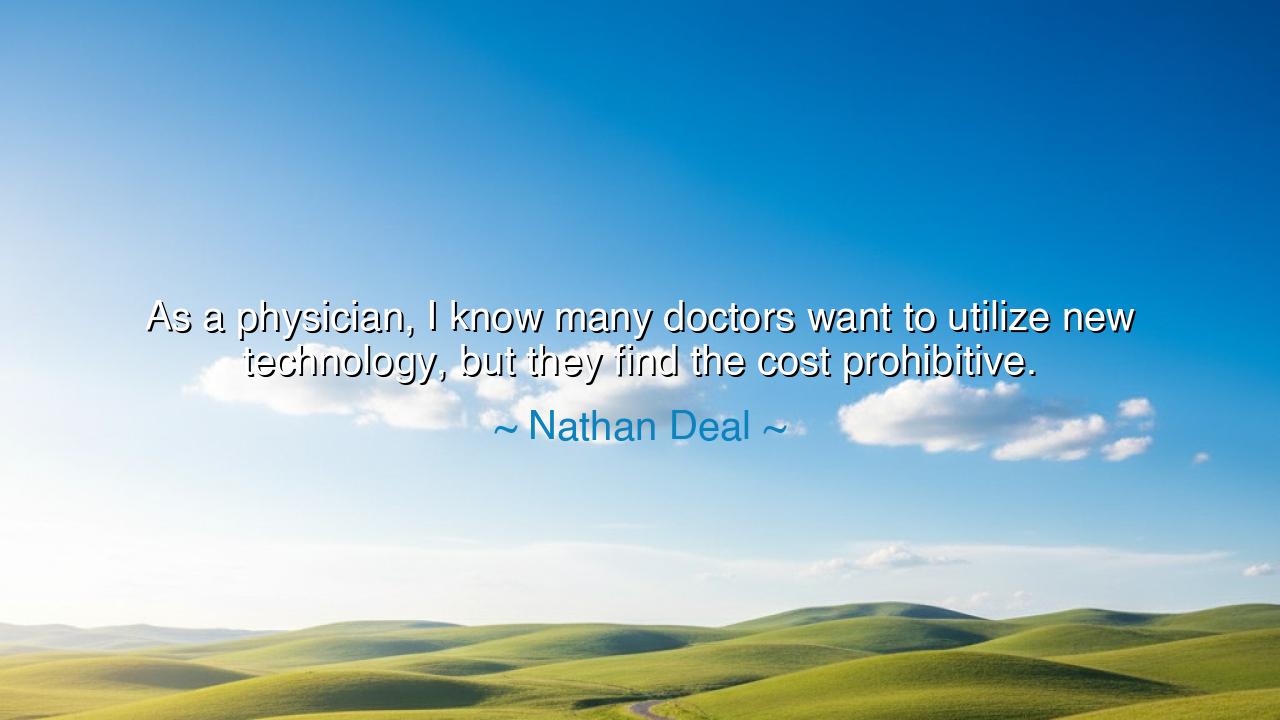
As a physician, I know many doctors want to utilize new
As a physician, I know many doctors want to utilize new technology, but they find the cost prohibitive.






"As a physician, I know many doctors want to utilize new technology, but they find the cost prohibitive." These words from Nathan Deal illuminate a critical tension in the modern world of medicine: the challenge of integrating cutting-edge technology into healthcare systems that are often constrained by financial realities. The desire of physicians to embrace advancements in medical technology for the benefit of their patients is often met with the harsh reality of cost and accessibility, where the promise of progress is hindered by the very resources needed to implement it. This reflection speaks not only to the innovations in medicine but also to the broader issues of how societies prioritize their resources and the tension between idealism and pragmatism.
In the ancient world, medicine was often a practice of deep wisdom and personal skill. However, even in the time of Hippocrates, the father of medicine, there was an awareness that the availability of healing depended on the resources at hand. Hippocrates taught that the art of medicine was as much about balancing natural remedies as it was about understanding the limitations of what was available. In ancient Greece, medical advancements were often hindered by the scarcity of tools and materials, and physicians could only work within the confines of what the society could provide. Just as Hippocrates faced such limitations, modern physicians today are similarly confronted with the challenge of working with the best tools available, constrained by the economic realities of healthcare.
The Romans too faced this issue when dealing with advancements in surgical techniques and medical devices. Roman physicians like Galen were able to develop remarkable insights into the human body, yet their practice was often limited by the lack of advanced equipment. Galen’s extensive knowledge of anatomy and medicine helped lay the foundation for surgical techniques that would not be fully realized until centuries later. His contributions, while extraordinary, were constrained by the technology of his time, showing that even the most brilliant minds in history were often stymied by the availability of resources. The lesson here is clear: advancement in medicine requires not only intellectual rigor but also access to the tools and resources that make such progress possible.
In more recent times, consider the story of Edward Jenner, who developed the smallpox vaccine in the late 18th century. Jenner’s discovery was groundbreaking and revolutionary, but it faced initial resistance and delay in widespread use due to a lack of widespread funding and infrastructure to implement the vaccine. Even in the face of scientific breakthroughs, the barrier of financial investment and systemic challenges prevented many from benefiting from new technologies. Jenner's efforts highlight the age-old dilemma that medicine faces: the need for innovation is undeniable, yet the means to bring it into practice often require vast resources—both monetary and societal.
Nathan Deal’s quote reflects the modern equivalent of this timeless issue. Technology in medicine, such as robotic surgery, genetic testing, and advanced imaging techniques, holds immense potential to improve patient outcomes and quality of care. However, the cost of these technologies often limits their widespread adoption, particularly in public healthcare systems or in underfunded regions. Healthcare providers find themselves caught between their desire to provide the best care and the economic constraints that limit access to these life-saving technologies. This dilemma is not new—history has always seen innovation delayed by the difficulty of translating ideas into action on a large scale.
The lesson we take from Nathan Deal’s words is not just a call for more investment in medical technology, but a deeper understanding of how we prioritize and allocate resources in society. If we truly value human health, then we must find ways to make advancements in medicine accessible to all. This means advocating for healthcare systems that balance the drive for progress with equitable access to the tools and technologies that can save lives. It calls for a recognition that economic barriers should never limit the potential of scientific discovery to improve the quality of life for everyone, regardless of their circumstances.
In our own lives, we must act as advocates for fair access to healthcare and medical innovation. Whether as consumers, healthcare professionals, or policymakers, we should advocate for systems that bridge the gap between technological advancements and financial accessibility. The challenges faced by physicians like Nathan Deal and historical figures such as Edward Jenner remind us that real change often requires both scientific brilliance and societal investment. We must ensure that the benefits of modern medicine are not reserved for the few, but are available to all who need them. Only through such actions can we build a world where healthcare innovation serves the greater good of humanity.






AAdministratorAdministrator
Welcome, honored guests. Please leave a comment, we will respond soon